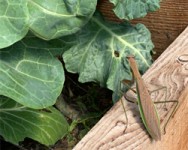Orleans Regional Vegetable Meeting
Event Details
Date
February 15, 2023
Time
12:45 pm - 4:00 pm
Location
CCE Orleans County
12690 Route 31
Albion, NY 14411
Cost
Registration Fee per Person : $10.00
Pre-register by calling 585-406-3419. Pay at the door by cash or check.
Host
Cornell Vegetable ProgramElizabeth Buck
585-406-3419
email Elizabeth Buck

DEC credits available: 2.25 in 1a and 10; 2.0 in 23; 1.5 in 22; and 0.5 in CORE (used in all categories)
Meeting cost is $10 per person, payable at the door via cash or check. Pre-registration requested by 5:00 pm on Monday, February 13. Call Elizabeth Buck at 585-406-3419.
12:45pm: Sign-in, survey completion
1:00 pm: Welcome and announcements
1:05 pm: Pesticide Safety for the Family & You -- Mary Centrella, Pesticide Safety Education Program
This presentation will focus on understanding and mitigating the health risks associated with pesticide usage and offer safety solutions.
1:35 pm: Managing White Mold -- Elizabeth Buck, CCE Cornell Vegetable Program
White mold is a difficult, long-lived disease that will attack most vegetable crops. Successfully managing a farm with white mold requires a range of preventative actions, regular scouting, and chemical management techniques.
1:50 pm: Encouraging Beneficial Insects -- Amara Dunn, NYS IPM Program
This hands-on session will go over what types of beneficials eat our most annoying pests and which ones can be found in the local landscape. You'll learn how to attract these hard-working insects into your field and keep them safe.
2:20 pm: Break
2:30 pm: Herbicide Options for Cole Crops -- Christy Hoepting, CCE Cornell Vegetable Program
An overview of herbicides for cole crops drawing heavily from recent research studies.
3:00 pm: Avoiding, Spotting and Treating Strawberry Disease -- Anya Osatuke, Berry Specialist, CCE Harvest NY
Identification of strawberry diseases can be nuanced - come learn some ID tricks. Anya will also cover techniques and tools to avoid diseases, explain how to break disease cycles, and give examples of chemical control strategies.
3:45 pm: What Can be Done about Insect-Vectored Vine Crop Diseases? -- Elizabeth Buck, Cornell Vegetable Program
Aphid-vectored viruses are a locally common and costly problem for vine crop growers. Cucurbit Yellow Vine Decline is spread by squash bugs and is suspected of becoming more widespread in WNY. Can insecticides manage these diseases? Is there a solution?
4:00 pm: Adjourn. Those meeting recertification credit requirements pick up their certificates.

Upcoming Events
African Eggplant Participatory Breeding Kick-Off
March 5, 2026
Join us to learn about the Cornell African Eggplant Research Project and learn how you can participate! African eggplant, also known as Bitterball, Garden Egg, Kittley and other names, is an important crop for many members of our community with heritage from regions such as sub-Saharan Africa, Southeast Asia, and Brazil. Since 2024, the Cornell African Eggplant Research Project has been collaborating with growers and community partners across New York to develop high-quality varieties adapted to the Northeast U.S. In this meeting, we will share information about growing and preparing African eggplant, highlight our research to date, and invite partners to collaborate with us in our 2026 participatory breeding and variety selection efforts.
COST: FREE! You must pre-register to receive the Zoom link.
Managing the Invasive Swede Midge Webinar
March 6, 2026
Swede midge is an invasive fly that causes serious economic losses to brassica crops. Due to its small size and hidden feeding habits, swede midge is often called an "invisible pest" and damage may be misdiagnosed. In this webinar, we will review the swede midge life cycle and crop damage symptoms, current management recommendations, new research findings, and highlights from on-farm case studies with a focus on organic management.
1.75 DEC pesticide recertification credits in categories 1a, 10, and 23.
Good Agricultural Practices (GAPs) Food Safety Training
March 10, 2026
Newark, NY
Learn about food safety on the farm! This event hosted by the Cornell Vegetable Program, Cornell Lake Ontario Fruit Team, CCE Wayne County, and the NYS Department of Agriculture, will cover good agricultural practices (GAPs) to help reduce the risk of microbial contamination on the farm, keeping food and consumers safe.


































